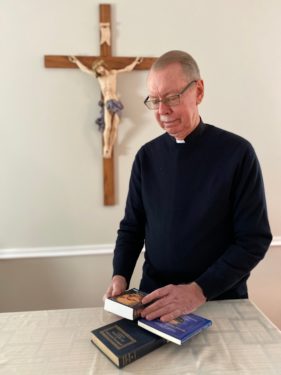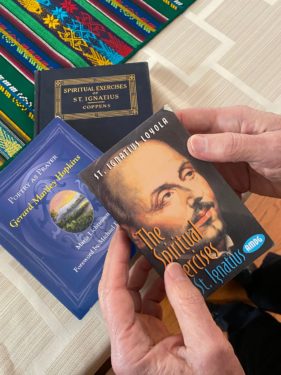
CROWN HEIGHTS — Serenity now with sanctity always.
That may be the goal of one’s prayer life, and a local Jesuit priest and a former Franciscan who’s now a psychologist have suggestions on how to get there.
Father Kenneth Gavin, S.J., superior of the Carroll Street Jesuit Community in Crown Heights, said that people can practice Ignatian spirituality in their prayer life.
“The key focus of Ignatian spirituality is finding God in all things. That’s what St. Ignatius [of Loyola, the 16th-century Spanish saint who founded the Society of Jesus, or Jesuits] wanted,” Father Gavin said.
“Jesuits focus on the sense of being contemplative in action — experiencing God in the quietness and everywhere in the world, both actively and quietly, which leads into closer communion with the Lord.”
Father Gavin suggests two simple forms of Ignatian prayer that people can practice daily: The Examen and contemplative prayer.
The Examen is a prayer that St. Ignatius wrote about in his Spiritual Exercises. It involves taking a deep look at one’s day, inviting God to be present and at work in all moments.
“It’s simply asking yourself every day, where did I discover God today, and where did I miss Him?” Father Gavin said.
“We become more aware of God in those simple moments in our lives — from the smile of a child on the subway to a walk through Prospect Park,” he said, noting that The Examen can take anywhere from five minutes at the end of every day to hours of deep, meditative silence.
“It’s an experience of contemplation that leads into action. It fuels our tank. It leads us into ministry … to know Jesus intimately, to love Him intensely, to follow Him more closely.”
Contemplative prayer, or the prayer of imagination, calls people to imagine they are in a Biblical scene, such as the Last Supper in the New Testament, and picture the full sensory details — almost like being transported into the scene itself.
Resources
- “The Mindful Catholic: Finding God One Moment at a Time” – by Dr. Gregory Bottaro
- Hallow – A Catholic meditation prayer app
- CatholicPsych.com – Meet with a licensed Catholic therapist
- The Examen podcast with Father James Martin, S.J.
“The focus is to put you in contact with Jesus,” Father Gavin said. “Allow yourself to feel, with all those senses, and then just to be with Jesus, quietly listening. Talk to the Lord as a friend talks to a friend.”
Gregory Bottaro — a clinical psychologist and former Franciscan friar who founded the CatholicPsych Institute, a Connecticut-based clinic that offers counseling based on Catholic beliefs — describes a sort of prayer or meditation known as “mindfulness.” It’s a way of dealing with anxiety by keeping God in mind.
While practicing mindfulness can “reduce chronic pains, anxiety and mood disorders more effectively” than some medical drugs, Bottaro said, Catholic mindfulness is different from the world’s idea of mindfulness, because it integrates Divine providence and true trust in God with the mind.
“Mindfulness that is not grounded in a Catholic worldview can sometimes be very relativistic, all about the self,” he said. “But it opens up the invitation to discover a Catholic reason for mindfulness, which requires trustful surrender and abandonment to Divine providence.”

Catholic mindfulness involves noticing your feelings and surroundings in the same way the Jesuits’ The Examen prayer invites you to. It starts with having complete faith.
“The problem with our culture and society is that we’re always on edge, trying to control things we can’t. It ultimately burns out our brains, causes fight-or-flight response, and we lose a lot of our self-care resources and that feeling of freedom, safety … it’s ultimately because we’re trying to be in control of our lives in a way that God didn’t intend. If we really trust God and surrender ourselves, we can live in a way that our brains and minds are at peace. We don’t have to worry about the things we’re not in control of.”
Both Father Gavin and Bottaro say meditation or prayer is not a selfish exercise, but rather something that leads people toward God and helping others.
“In the midst of conflict, lack of civility in our church and in the world, we can still hope that our lives fall basically into the arms of our loving God,” Father Gavin said. “Self-help and mindfulness is not selfish, a fascination with ‘me.’ It leads to contemplation and awareness that leads us outside our- selves, in love and service to others.”
